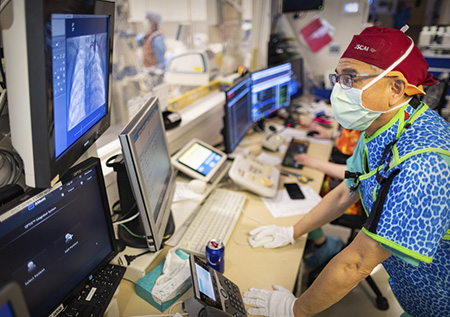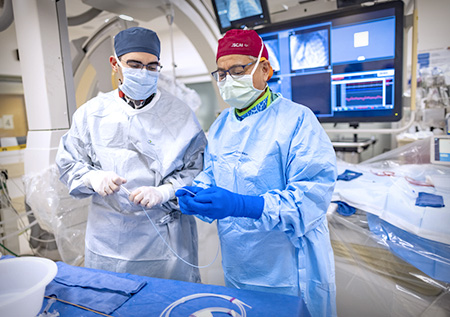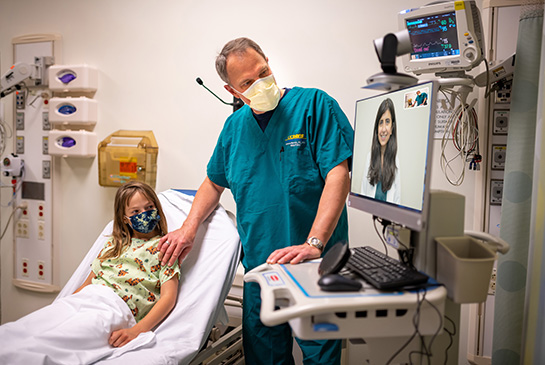Pediatric Heart Center
Cardiac catheterization
Cardiac catheterization is a non-surgical procedure that is used to diagnose and treat many heart conditions.
Diagnostic catheterization

Pediatric cardiologists can often understand the structure of the heart by using noninvasive imaging tests, including ultrasound (echocardiography) and cardiac MRI. In some cases, certain parts of the heart are better seen using cardiac catheterization.
We use cardiac catheterization to accurately measure how well your child’s heart is pumping and how much blood is flowing, and to discover any evidence of scar tissue in the heart. We perform cardiac catheterization on newborns, infants, children and young adults.
During cardiac catheterization, we thread a long, thin, flexible tube, called a catheter, through your child’s large blood vessels and into the heart. The catheter allows us to measure pressures and draw blood samples. We use these measurements to determine how blood is flowing to different parts of your child’s body. Sometimes we perform an angiogram by injecting X-ray dye through the catheter so that we can see important anatomic details of your child’s heart.
We may perform a cardiac catheterization on your child to:
- Diagnose a heart problem
- Learn more about a heart problem
- Obtain cardiac tissue samples for biopsy
- Conduct an invasive electrophysiology study (EP), if your child has an abnormal heart-beat, to locate the origin of the arrhythmia and determine how best to treat it

Interventional catheterization
Advances in interventional cardiac catheterization have improved outcomes for children with congenital heart disease greatly during the past 10 years. Corrective or therapeutic procedures can be performed during a catheterization to either complement a surgical procedure or treat a congenital or acquired heart defect without surgery. Specialists in the Pediatric Heart Center at UC Davis Children’s Hospital have the experience, technology and expertise needed to successfully treat the full range of congenital heart problems in children and young adults.
Some of the most common pediatric interventional catheterization procedures include:


Healing Preemie Hearts | Focus on Health | KVIE Digital Studios
- Closure of atrial septal defects (ASD) or ventricular septal defects (VSD)
- Closure of Patent Ductus Arteriosus (PDA) in Neonatal Intensive Care Unit babies
- Balloon valvularplasty to repair:
- Mitral valve prolapse
- Mitral stenosis
- Aortic stenosis
- Pulmonary stenosis
- Valve replacement procedures
Your child’s cardiologist will discuss the best option based on your child’s condition.
Development of additional interventional cardiac catheterization procedures to treat other congenital heart conditions in children and adults is continuing.
Referrals and appointments
Clinic locations and appointments
Families have access to our full-service Pediatric Heart Center along with the added convenience of six outreach clinic locations.
For referring physicians, please call our patient referrals phone number at 916-734-3456 for assistance with pediatric cardiology services or use on our online referral form.
Pediatric Heart Center - main clinic location
77 Cadillac Drive, Suite 101
Sacramento, CA
Sacramento clinic appointments
Outreach clinics
We have 6 convenient locations in the surrounding communities.


